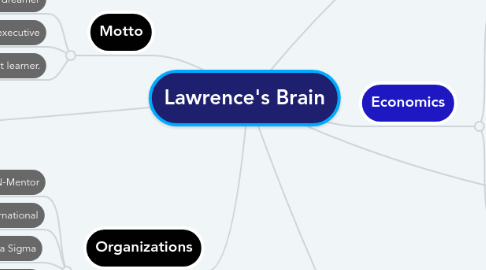
1. Personal Facts
1.1. Nationality
1.1.1. Taiwanese
1.1.1.1. Nantun, Taichung City
1.1.2. Canadian
1.1.2.1. Burnaby, British Columbia
1.2. Languages
1.2.1. Eastern
1.2.1.1. Taiwanese Mandarin (Bilingual Native)
1.2.1.2. Taiwanese Sign Language (Professional)
1.2.1.3. Taiwanese (Average)
1.2.1.4. Cantonese (Average)
1.2.1.5. Japanese (Basics)
1.2.2. Western
1.2.2.1. Canadian English (Bilingual Native)
1.2.2.2. Canadian French (Basics)
1.2.2.3. American Sign Language (Basics)
1.2.2.4. Esperanto (Basics)
1.3. Education
1.3.1. National Taiwan University
1.3.1.1. School of Social Science
1.3.1.1.1. Department of Ecomomics
1.3.1.2. School of Management
1.3.1.2.1. Department of Finance
1.3.1.3. School of Biology and Agriculture
1.3.1.3.1. Department of Agricultural Economics
1.3.2. University of British Columbia
1.3.2.1. School of Art and Science
1.3.2.1.1. Department of Economics
1.3.2.2. Continuing Education
1.3.2.2.1. IGSIP Program (Summer)
1.3.3. Columbia University
1.3.3.1. Columbia Business School
1.3.3.1.1. VFA Program (Winter)
1.3.4. Johns Hopkins University
1.3.4.1. Carey Business School
1.3.4.1.1. MS in Enterprise Risk Management
1.3.4.1.2. MS in Health Care Management
1.3.4.2. Krieger School of Art and Science
1.3.4.2.1. Department of Economics
1.4. Other Abilities
1.4.1. Professional Bartending
1.4.1.1. 1 Year Full Experience
1.4.2. Acupuncture Point Massage
1.4.2.1. Over 300 Times Given
1.4.2.1.1. Machine Learning Project
1.4.3. Ikebana (Japanese Flower Art)
1.4.3.1. 1 Year Partial Experience
1.4.4. (Ammatuer) Flutist
1.4.4.1. 6 Years Training
1.5. Websites
1.5.1. Personal Website
1.5.1.1. hsuzchan
1.5.2. LinkedIn
1.5.2.1. https://www.linkedin.com/in/hsuzchan/
2. Organizations
2.1. ECON-Mentor
2.2. Mensa International
2.2.1. America Mensa
2.2.1.1. Metropolitan Washington Mensa (MWM)
2.3. Beta Gamma Sigma
2.4. Taiwanese Student Association
2.4.1. Carey Representative
2.5. NTU Alumni Association
2.5.1. DC Chapter
3. Motto
3.1. Set 150% goals as a great dreamer
3.2. Finish 80% of them as an executive
3.3. Gain the 120% growth as a fast learner.
4. Facing the Reality
4.1. Ph.D. Application
4.1.1. Main Problems
4.1.1.1. GPA Ruined
4.1.1.2. GRE Preparation
4.1.1.3. Papers to be Published
4.1.2. Subject Choice
4.1.2.1. Ph.D. Economics
4.1.2.2. Ph.D. Health Economics
4.1.2.3. Ph.D. Business Economics
4.2. Find a Job
4.2.1. Area Choice
4.2.1.1. Health Operation
4.2.1.2. Research Assistant
4.2.1.3. Data Science
4.2.1.4. Economic Consulting
4.2.2. Identity Problems
4.2.2.1. H1-B Visa Sponsorship vs. Trump
4.2.2.2. TN1 Visa under NAFTA vs. Trump
4.2.2.3. Poor French vs. Toronto Job Search
4.2.2.4. Other Cities vs. Non-Target School
4.3. Need Companion
4.3.1. Friends and Classmates
4.3.1.1. Too Serious for a Full Schedule
4.3.1.2. Identity Crisis to Stay in USA
4.3.2. Relationship
4.3.2.1. Time Differences :(
4.3.2.2. She is Too Young to Get Married :(((
5. Problems to Solve
5.1. Generation Gap
5.1.1. Internet
5.1.1.1. Open Information around the World
5.1.1.2. Kids are More Mature than Ever
5.1.1.3. Missing Boundary: Pooling v.s. Separating
5.1.2. Culture
5.1.2.1. How to Handle the Next Generation?
5.1.2.2. Why are Smart People having Fewer Kids?
5.1.2.3. How to Break the Tradition Barrier?
5.2. Liberty and Freedom
5.2.1. Why Nations Fail
5.2.1.1. Apply Knowledge Economics
5.2.1.1.1. Rise Human IQ by Avoiding Nametags
5.2.1.2. Boosting the Shared Economy
5.2.1.3. How did Communism Change
5.2.2. Humanity Issues
5.2.2.1. Neglected & de Facto Nation Identities
5.2.2.2. Global Children Support
5.2.2.2.1. NGO Sponsorship (e.g. Save the Children)
5.2.2.3. Global Income Inequality
5.2.2.3.1. Continue the Economic Research
5.2.2.4. Political Interfered Missing Population
5.2.2.5. Require Rights of LGBTQIAPK+
6. Lifestyle
6.1. Daily
6.1.1. Teaching
6.1.1.1. Online Lectures
6.1.1.2. Teaching Assistants
6.1.1.3. Carey Tutoring
6.1.2. Mentoring
6.1.2.1. 66 Mentees in NTU
6.1.2.2. Busy Writing Materials
6.1.3. Learning
6.1.3.1. Ph.D. Economics Courses
6.1.3.2. MS Health Care Management Courses
6.1.3.3. Online Learning (Coursera)
6.2. Habits
6.2.1. Rest
6.2.1.1. 4 Hours Minimum
6.2.1.2. 6 Hours Maximum
6.2.2. Food
6.2.2.1. Meatless Mondays
6.2.2.2. Less Meat in Meals
6.2.2.3. Sugar Control on Weekends
6.2.3. Energy
6.2.3.1. Keep it Unlimited
6.2.3.2. Boost Recovery Rates
7. Economics
7.1. Applied Microeconomics
7.1.1. Experimental Economics
7.1.1.1. Problem Design
7.1.1.2. Higher-Level System Thinking
7.1.2. Neuroeconomics
7.1.2.1. Medical Assistance Expected
7.1.2.2. Data Limits under HIPAA
7.1.3. Behavioral Economics
7.1.3.1. Incentive Design
7.1.3.2. Profit-Driven Thinking
7.2. Game Theory
7.2.1. Industrial Organizations
7.2.1.1. Firm Strategies
7.2.1.2. Co-opetition
7.2.2. Economics of Networks
7.2.2.1. Social Networking
7.2.2.2. The Power of Marketing
7.2.2.3. Structural Traps
7.2.3. Mathematical Dereviations
7.2.3.1. Brain Training (IQ)
7.2.3.2. Logic Training (MECE)
